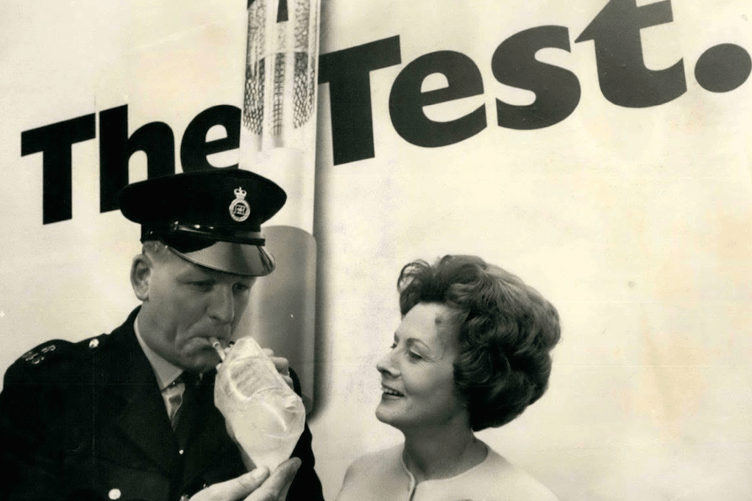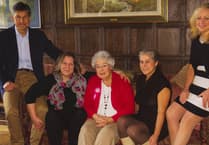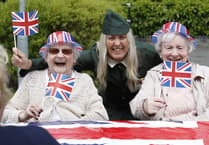Barbara Castle, who became arguably the most prominent woman in the Labour Party, received a stormy reception when she visited Woking in November 1967.
The visit was for her to open a £28,000 extension to the British Transport Staff College at Gorse Hill, Hook Heath.
At the time, Mrs Castle was transport minister in the Labour government.
It was she who introduced the breathalyser test after a law setting out the first drink-drive limits as part of the Road Safety Act 1967.
Many people were displeased with the introduction of the roadside breath test, not least those in the pub trade.
A week before Mrs Castle’s trip to Woking, the News & Mail, in its issue of November 11, reported that a protest against breath testing was being planned.
The report said: “Angry publicans are planning an anti-breathalyser protest this morning (Friday) as transport minister Mrs Barbara Castle arrives in Woking.
“Mrs Castle, here to open the extension to the British Transport Staff College at Hook Heath, is due to arrive at the college at noon. And the banner-waving publicans will be waiting for her.
“All this week, Mr Len Hollingdale, licensee of the Rowbarge, St John’s, has been organising a campaign.
“On Tuesday evening, his night off, he went round pubs recruiting protesters.
“He spent Wednesday evening painting slogans on banners.
“More than 30 publicans, with families and friends, will march from the Rowbarge at 11.30am this morning.
“Mr Hollingdale said: ‘There will be no lying down or anything like that. We’re responsible people but we must protest. Let’s face it, local publicans are scared stiff about this breathalyser business. Something has got to be done. A protest is the best thing.’
“Of all the local pubs he has contacted there has only been one refusal. And this, he says, is from a pub without a car trade.”
The following issue of the News & Mail reported what had happened, noting about 30 people took part in the protest led by Mr Hollingdale.
They waved placards that read “Three boos for Barbs” and “Hitlers and Musos alive alive oh!”.
The only acknowledgment they received from Mrs Castle was a smile as she swept through the gates in a black ministerial limousine.
The report added that she was unruffled by the protest and went on to meet college staff, accompanied by the chairman of British Rail, Sir Stanley Raymond.
She presented Mrs Sally West, the college house superintendent, with her British Empire Medal that had been awarded, in the Birthday Honours, for her distinguished service to the college.
At a press conference Mrs Castle said the aim of the college was to encourage and develop transport managers and help improve the management of transport sources.
She said the college was started in 1959 as a result of a report by Sir Stanley for the British Transport Commission.
However, it was initially opened in January 1947 as the Southern Railway Staff Training College.
The News & Mail’s report continued by noting that the college then held a three-month course of general management studies for 36 senior managers from all parts of the transport industry both from Britain and overseas.
During the course the students toured Europe, studying mainland European transport.
The report also said that the extension Mrs Castle opened covered a small site, with the ground floor of the two-storey block containing four offices and the first floor having six offices for instructional staff, and a library connecting the existing block to the new building.
After touring the extension, Mrs Castle joined the guests for a buffet lunch of pheasant, ham, pork, turkey and salmon with salad.
However, when Mrs Castle met reporters afterwards there were no questions about the “controversial” breathalyser law or the demonstration.
The report said the press had been instructed to confine their questions to the college and its extension.
The News & Mail said that later in the afternoon, Mrs Castle – wearing a black and red check suit with a black fur hat – arrived at a Woking traffic-sign exhibition, where she spent 15 minutes looking at displays in the exhibition caravan with the chairman of Woking Urban District Council.
It was here that another protest took place. Indeed the News & Mail’s report led with this second protest.
The headline was “Double protest as transport minister opens new college extension” and the sub-heading was “Plea for safety from woman”.
The report said that during this protest, Mrs Castle was approached from the crowd by a mystery woman.
The woman asked Mrs Castle to take action over the danger to children attending Flexlands School in Chobham.
Mrs Castle listened to the woman for five minutes and agreed to investigate the matter and take it up with Bagshot Rural District Council.
The background to this incident was, said the News & Mail, in 1965 one of the girls attending the school was killed, and there had been mounting protests about the danger caused by increased traffic.
Apparently there was a plan to make the road outside the school one-way. But Bagshot council deferred the matter until all complaints could be examined.
My thanks go to Peeps researcher Mark Coxhead for finding this story in back copies of the News & Mail on microfilm at the Surrey History Centre in Woking.


.jpeg?width=209&height=140&crop=209:145,smart&quality=75)


Comments
This article has no comments yet. Be the first to leave a comment.